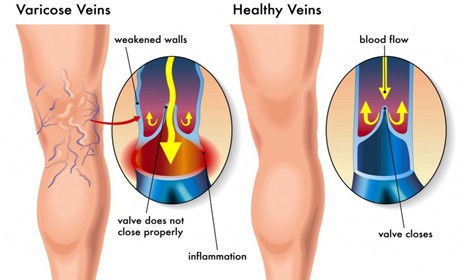
What are varicose veins?
Simply put, varicose veins are veins that have become enlarged. They commonly appear on the lower legs, but may also be found on the thighs or other areas. These enlarged veins may visibly bulge under the skin and can appear purple or dark blue through lighter skin. Under darker skin, the colour may not show through but the veins will still be lumpy and prominent. Varicose veins may cause pain or discomfort or be completely painless.
They can affect surface veins, or those located in deeper tissue. Do not confuse varicose veins with blue veins or spider veins, these are separate conditions. Varicose veins affect women more than men, and generally affect one in three people. In the UK alone, over 20 million people are blighted by varicose veins.
What causes varicose veins, and can they be prevented?
Veins contain valves that help prevent blood from flowing backwards. Think of them as the flippers on a pin-ball machine. When those valves become damaged or weakened, blood does not travel easily up the legs and may instead pool in areas. These areas of pooled blood are what people see as lumpy bulges. Several factors can cause varicose veins. These include:
- Heredity – other members of your family suffer from them
- Pregnancy
- Obesity
- Age
- Standing for long periods of time
To prevent varicose veins, try the following:
- Maintain a healthy weight
- Avoid long periods of standing still
- Compression stocking may be worn if standing cannot be avoided
- Exercise regularly
How do you know if you have varicose veins?

Most people become aware of varicose veins by seeing them. There may not be other symptoms, or there may be symptoms that range from mild to severe. These other symptoms may include the following:
- Aching or heavy legs
- Mild swelling
- Itching over the veins
- Severe
- Significant swelling
- Fluid build-up
- Skin colour changes around the ankle and lower leg
- The development of blood clots and inflammation in small surface veins
- Open sores
Varicose vein complications
Most varicose veins are benign and do not cause complications. However, severe varicose veins can cause complications due to poor circulation. These complications can include:
- Bleeding
- Eczema
- Ulcers
- Red, painful inflammation of veins
Varicose veins can also sometimes be a sign of deep vein thrombosis – a condition characterized by a blood clot or blockage in deeper veins. This condition can be serious and may require further treatment.
What are the treatments for varicose veins?
Varicose veins can be treated at home or by healthcare professionals. Home treatment is usually the recommended route. These remedies include elevating the legs, wearing compression stockings and exercise. If these treatments do not work, or if patients want to further improve the appearance of their veins, more serious treatments can be performed. These include:
- Laser treatment
- Radio Frequency treatment
- Closing off small veins with a chemical injection (Sclerotherapy)
- Tying off and removal of veins (Ligation and stripping)
Dr Florian Netzer of London Bridge Plastic Surgery offers a thorough consultation an examination, including ultrasound assessment. This allows him to accurately visualize and diagnose each patient. From there he will develop highly effective, individual courses of treatment using the most modern techniques.
These treatments do not cause scarring, hyper-pigmentation or damage to surrounding tissues. In most cases, patients need only one round of treatments to address all problem veins, and need only wear compression garment for one day following treatment. Significantly, Dr. Netzer’s treatments require little to no downtime, allowing patients to return to work the next day.


As a man, I’m not prone as much to suffer from them, but if I had them, I’m not sure if I would have them removed. I just have this intense aversion against people sticking sharp things into me and poke around.